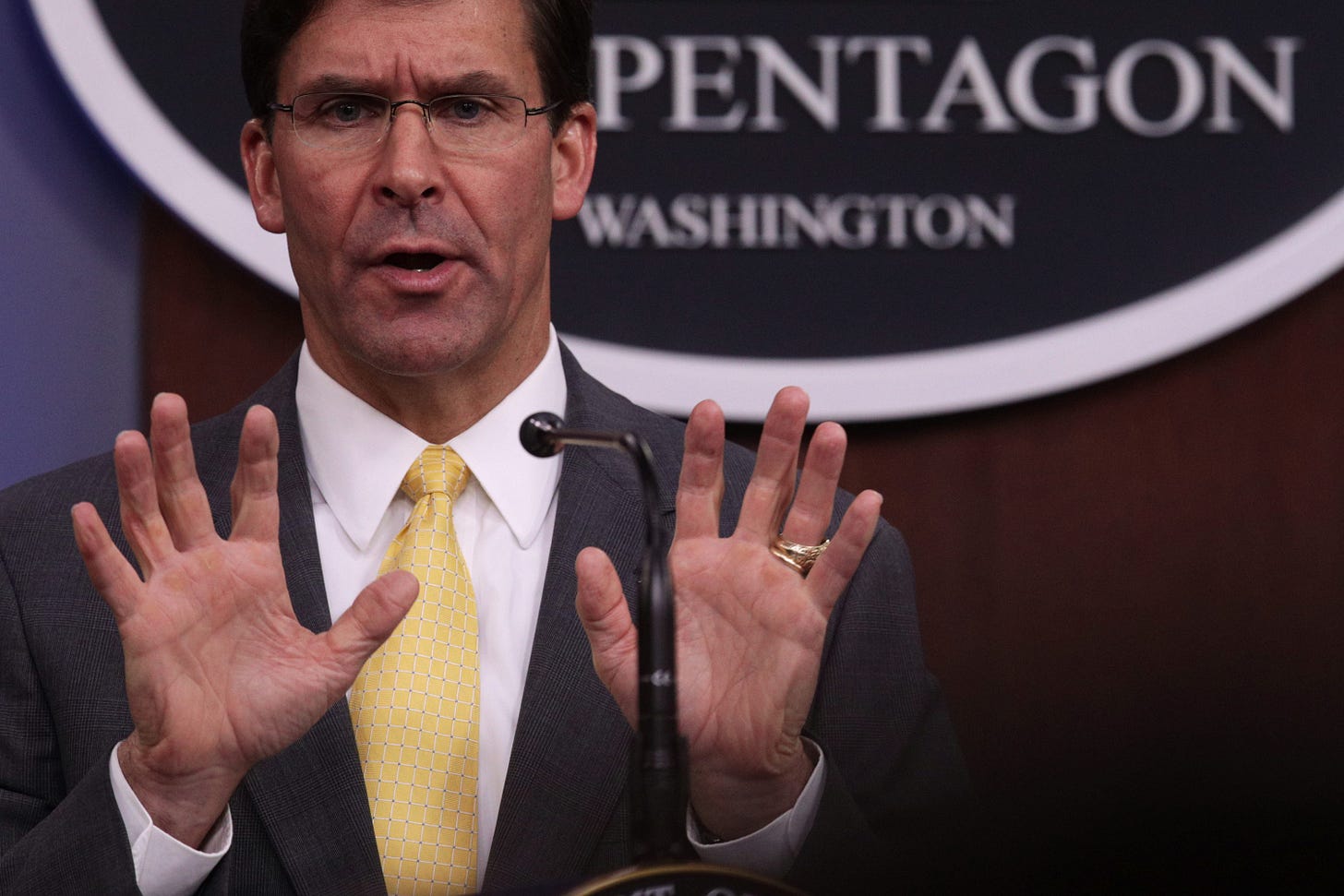Trump’s Syria Cut-and-Run Is an Act of Unimaginable Weakness

On Sunday, Secretary of Defense Mark Esper appeared on Face the Nation and did his best to rationalize President Trump’s impulsive decision to move American troops away from the border between Syria and Turkey. Mitigating that decision was no easy assignment, and while Esper may have done his best, his explanation was more of a condemnation of Trump than a defense of him.
Essentially, Esper said that Trump ordered the removal of the American troops in order to get them “out of harm’s way.”
At best, Esper’s defense of Trump’s decision tells a story of unimaginable American weakness, a disgraceful cut-and-run in the face of a highly unrealistic threat by a regional strongman whose military could not possibly stand up to determined American force. At worst, it is an outright lie, a cover-up for an impetuous, inexplicable action by a colossally ignorant US president.
Esper’s story goes like this: Although a small presence of the American military has for years deterred a Turkish slaughter of our Kurdish allies who did all of the dirty work in our campaign to bring down the ISIS caliphate, for some reason Turkey was now “fully committed to conducting this incursion.”
Turkey was going to do this, Esper said, despite America’s strong opposition and the presence of American troops in the war zone.
So we had to move them out of harm’s way so that Turkey would be able to invade without risking a confrontation with the United States.
But we are supposed to believe that doesn’t mean we gave Turkey the green light. No sir.
Esper concedes that we were fully aware of all the disastrous things that would happen if Turkey invaded northern Syria and started slaughtering the Syrian Kurds.
We had “every expectation” that the Kurds would “cut a deal with the Syrian and Russian forces” in order to protect themselves “from being killed by Turkey.”
We knew that the Kurds would be forced to strike those deals “to protect themselves from being killed by Turkey.”
We knew that pulling out would lead to a resurgence of ISIS because the Kurds would have more important priorities than guarding prisoners - like staying alive. This would result in “the likely release of [10,000 ISIS] fighters” from camps and prisons that were being guarded by the Kurds.
We saw “a humanitarian crisis emerging” when the Kurds began to be displaced in a campaign of ethnic cleansing.
We knew the relationship between the United States and Turkey would be damaged. Both the United States and Europe “are already talking about specific sanctions and actions” against Turkey, our NATO ally.
We know Turkey’s “standing in NATO and Europe is being hurt.”
We know that Turkey is using Arab militias as “proxy forces,” even though “we don’t know exactly who they are and what they’re doing.”
We already have “reports from the battlefield” which, if true (and how could they not be in light of the graphic video evidence), “would be war crimes.”
None of this has been a surprise. We anticipated all of it. “Everything we told them–all the reasons why we told them not to do this–are coming to bear.”
So what did we do?
We got out of their way.
Incredulous, interviewer Margaret Brennan asked Esper, “But do you actually believe Turkey would fire on U.S. forces. We are NATO allies.” The best Esper could do with this question was, “Well, I don’t know whether they have – they would or they wouldn’t.”
By now it was clear to Brennan, and anybody else who was listening, that what Esper was describing was a retreat. “So how does that not amount to a retreat?” she asked. “You’re saying that the president of the United States, the commander in chief, said ‘don’t do this’ and then Erdogan said, ‘I am’ and he [Trump] said Okay?”
Esper’s pathetic response was that he “wouldn’t characterize it this way – that way.” We’re not retreating, we just “did not want to put American forces in harm’s way.”
See the difference?
Think about this. The United States of America, the mightiest nation in the world, in the face of a barely credible threat (maybe “they would” or maybe “they wouldn’t” have confronted U.S. forces) by a far weaker country, and knowing the disastrous consequences that would result, not only for the Kurds but for the United States as well, retreated.
Instead of standing up to Turkey’s dictator and telling him that the United States would not permit Turkey to slaughter our Kurdish allies, and that there would be hell to pay if a single American soldier was killed or injured by Turkish forces or their surrogate militias.
Instead of using all of our diplomatic resources, including our European allies, to find a diplomatic solution.
And we’re doing this on the basis of an impulsive decision, made on the spur of the moment by a reckless president, without anything even resembling a deliberative process.
Proving, yet again, that Donald Trump doesn’t know the difference between strength and weakness any more than he knows the difference between truth and lies.


